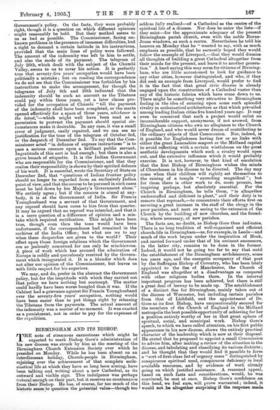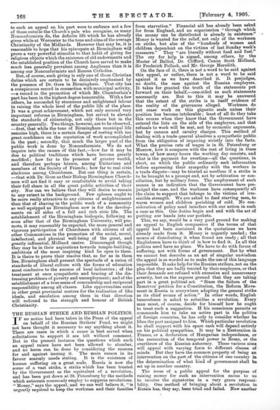T HE note of strenuous earnestness which might be expected to
mark Bishop Gore's administration of his new diocese was struck by him at the meeting of the Birmingham Church Extension Society over which he presided on Monday. While he has been absent on an interdiooesan holiday, Church-people in Birmingham, rejoicing over the achievement of that complete eccle- siastical life at which they have so long been aiming, have been talking and writing about a new Cathedral, as its outward and visible sign. This indulgence was perhaps natural enough on their part, but it receives no countenance frOm their Bishop. He has, of course, far too much of the historic sense to question the potential value—though too seldom fully realised—of a Cathedral as the centre of the spiritual life of a diocese. Nor does he enter the lists—if they exist—for the approximate adequacy of the present Birmingham parish, church, even with the noble Burns- Jones windows, as such a centre. Nevertheless he told -his hearers on Monday that he " wanted to say, with as much emphasis as possible, that he earnestly hoped they would follow the example of Liverpool,—that they would dismiss all thoughts of building a great Cathedral altogether from their minds for the present, and leave it to another genera- tion." A hard saying this may seem for citizens of Birming- ham, who are little accustomed to look for guidance to any other cities, however distinguished, and who, if they did seek an example from Liverpool, would prefer to find it in the fact that that great civic diocese is already engaged upon the construction of a Cathedral vaster than any of the historic fabrics which have come down to us. There might be something very attractive to Birmingham feeling in the idea of entering upon some such splendid rivalry in ecclesiastical architecture as that which prevailed among leading Italian cities five hundred years ago. It may even be conceived that such a project would enlist no inconsiderable support, anonymous, if not avowed, from Birmingham citizens who own no allegiance to the Church of England, and who would never dream of contributing-to the ordinary objects of that Communion. Nor, indeed, is it possible for Englishmen having few or no :links with either the great Lancashire seaport or the,Midland capital to avoid reflecting with a certain wistfulness on the great aesthetic developments which such a rivalry would- open out, and the extensive influence which it would probably exercise. It is not, however, to that kind of emulation that the first Bishop of Birmingham wishes the minds of Churchmen in his diocese to be directed. The day may come when their children will rightly set themselves to the raising of a temple " exceeding magnifica' " ; but for them there is other work to do, more prosaic, less inspiring perhaps, but absolutely essential. For the Church in Birmingham, he tells them, ? is altogether understaffed and deficient in plant," and their duty is to remove that reproach,—to concentrate their efforts first.= securing a great increase in the staff of the clergy in the poor parishes, and, next on seeing. to the extension of the Church by the building of new churches, and the found- ing, where necessary, of new parishes.
The facts are, no doubt, as Bishop Gore thus indicates. There is no long tradition of well-organised and efficient church-life in Birmingham—as, for example, in Leeds—and much of the work begun under the inspiration .of Hook, and carried forward under that of his eminent successors, in the latter city, remains to be done in the former. Indeed, it would not be going too far to say that until the establishment of the Birmingham •archdeaconry, some ten years ago, and the energetic occupancy of that post by the Suffragan Bishop of Coventry, who has been lately appointed to the See of Manchester, the Church of England was altogether at a disadvantage as compared with other religious bodies there. In the interval important progress has been achieved, but there is still a great deal of leeway to be made up. The establishment of a distinct See for Birmingham, mainly taken out of the diocese of Worcester, but including certain parishes from that of Lichfield, and the appointment of Dr. Gore as its first Bishop, have unquestionably secured for the members of the Church of England in the Midland metropolis the best possible opportunity of achieving for her a position entirely worthy of her in that great sphere of spiritual, social, and municipal work. Bishop Gore's speech, to which we have, called attention, on his first public appearance in his new diocese, shows the entirely practical character of the leadership which is now at their disposal. He stated that he proposed to appoint a small Commission to advise him, after making a review of the situation in the diocese, and tabulating and classifying its various districts ; and he thought that they would find it possible to form a "sort of first-class list of urgency cases " distinguished by conspicuous spiritual need, conspicuous deficiency in local available resources, and by evidence of work already going on which justified assistance. A reasoned appeal, based on such facts and considerations, would, he was convinced, be met at once. Bishop Gore's confidence on this head, we feel sure, will, prove warranted ; indeed, it would not,he altogether surprising if the response made to such an appeal on his part were to embrace not a few of those outside the Church's pale who recognise, as many Nonconformists do, the definite lift which he has already given while at Worcester to the tone and aims of the average Christianity of the Midlands. However that may be, it is reasonable to hope that his episcopate at Birmingham will prove a very powerful stimulus to that habit of giving for religious objects which the existence of old endowments and the established position of the Church have served to make much less generally prevalent among Anglicans than it is among our Nonconformists and Roman Catholics.
But, of course, such giving is only one of those Christian duties which are certain to be decisively emphasised by the presence of Dr. Gore in Birmingham. That city has a conspicuous record in connection with municipal activity, —a record in the promotion of which Mr. Chamberlain's part has been in the highest degree honourable. With a few others, he succeeded by strenuous and enlightened labour in raising the whole level of the public life of the place. It was a great achievement, which not only secured very important reforms in Birmingham, but served to elevate the standards of citizenship, not only there but in the country generally. Two things, however, are to be observed, —first, that while the tone of Birmingham municipal life remains high, there is a certain danger of resting with too great confidence on the reputation of work accomplished in the past ; secondly, that much the larger part of the public work is done by Nonconformists. We do not inquire into the causes of this fact,—how far it may be due to political traditions which have become greatly modified ; how far to the presence of greater wealth, and therefore perhaps' leisure, among Unitarians and members of the Society of Friends ; how far to real civic slackness among Churchmen. But one thing is certain, —that with Dr. Gore as their Bishop Birmingham Church- men will not find it easy or comfortable to avoid taking their full share in all the great public activities of their city. Nor can we believe that they will desire to remain to any extent in the background. Few spheres ought to be more really attractive to any citizens of enlightenment than that of sharing in the public work of a community so well equipped as Birmingham now is for the develop- ments on all sides of a full and rich civic life. The establishment of the Birmingham bishopric, following so soon after that of the Birmingham University, will pro- mote, it may reasonably be expected, the more general and vigorous participation of Churchmen with citizens of all other Communions in the promotion of the social, moral, intellectual, and physical well-being of the great, and greatly influential, Midland centre. Discouraged though they may be in their aspirations towards temple-building, ambitions of the most inspiring kind lie open to them. It is theirs to prove their resolve that, so far as in them lies, Birmingham shall present the spectacle of a union of standards of liberal culture with the forms of education most conducive to the success of local industries ; of the treatment at once sympathetic and bracing of the dis- tressing problems of poverty and unemployment; and of the establishment of a true sense of comradeship and reciprocal responsibility among all classes. Like opportunities exist in other great provincial centres for the realisation of like ideals, and emulation among them in that direction will redound to the strength and honour of British Christianity.
THE RUSSIAN STRIKE AND RUSSIAN POLITICS.











































 Previous page
Previous page